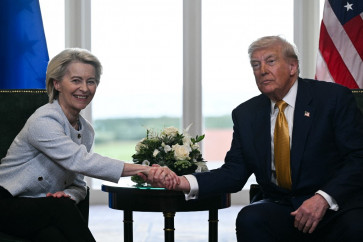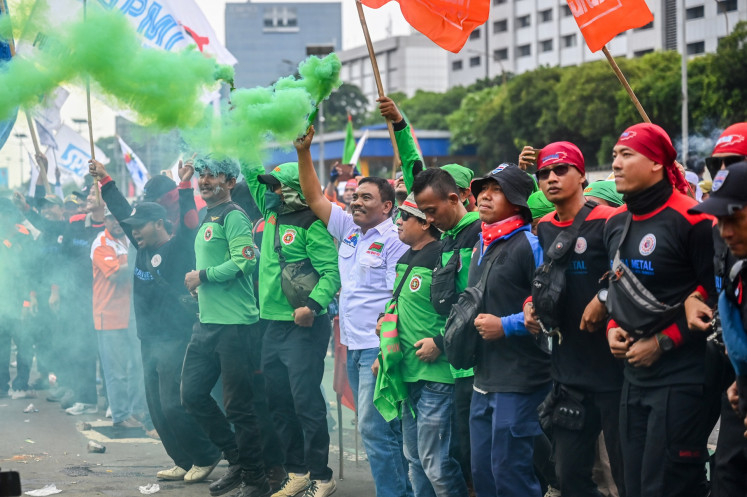Popular Reads
Top Results
Can't find what you're looking for?
View all search resultsPopular Reads
Top Results
Can't find what you're looking for?
View all search resultsSay no to minority thinking
Although it has become a global phenomenon, the Chinese New Year seems to occupy an interesting position in Indonesian history, particularly for Chinese Indonesians
Change text size
Gift Premium Articles
to Anyone
A
lthough it has become a global phenomenon, the Chinese New Year seems to occupy an interesting position in Indonesian history, particularly for Chinese Indonesians. Besides being a living tradition from generation to generation, the Lunar New Year reminds them of memories of the past when any traditions associated with it were prohibited until finally officially recognized as a national holiday.
Born in 1987, as a third-generation Chinese-Indonesian (my grandfather and grandmother were born in mainland China), I witnessed the transformation of history that runs in rapid rhythm.
When attending primary school, I had to learn the Chinese language secretly because of the government ban. In junior high school, I was able to celebrate Chinese New Year and found it easier to find Barongsay (Lion Dance) and Chinese books on the road. In high school, I suddenly fully enjoyed the Chinese New Year in a holiday atmosphere. Moving onto college, finally I understood what happened to Chinese-Indonesians.
Since childhood, I have been told of a family doctrine that as a Chinese person I must be vigilant. The doctrine also says that Chinese are minorities who Indonesian natives or pribumi hate simply because they see Chinese as rich people who do not care about the poor and their society. I found the doctrine was true especially because I routinely endured verbal abuse. Every time I walked home from school, people yelled 'Cina!' at me, a pejorative expression that means Chinese.
When the 1998 tragedy broke out, I was an 11-year-old child who heard the horror that many Chinese descendants were raped, burned alive and tortured. Of course I did not really know what was really happening, but since the burning of Jakarta, Chinese Indonesians were considered an integral part of Indonesia, who are equal with the Sudanese, Javanese, Bataks, Timorese and so on.
Although latent discrimination remains, year after year Chinese-Indonesians have increasingly gained ground. Chinese traditions (oral, written or material) appear in front of the community. Anti-discrimination legislation was passed and most recently the government opted to use Tionghoa in reference to China to reduce the impact of the trauma Chinese-Indonesians had faced.
In politics, Chinese-Indonesians have started to play a crucial role, especially with the inauguration of Basuki 'Ahok' Tjahaja Purnama as Jakarta governor. It is possible that someday he or another Chinese-Indonesian will win the presidency.
I am grateful to not only see the transformation of Chinese-Indonesian history, but also be part of it. Some Chinese-Indonesians remain afraid of speaking out or even identifying themselves. At the same time, I was amazed by Chinese-Indonesian friends who fell victim to persecution, threat and injustice in the past, but now have emerged as defenders of minorities.
Lie Dharmawan was a humanitarian worker during the 1998 tragedy and received death threats. He successfully pursued a career as a doctor in Germany, but chose to return to Indonesia and devote himself to the people. He set up doctorSHARE, a non-profit organization known for its innovative Floating Hospital that provides free medical care to marginalized people in rural areas.
Ester Jusuf trembled while witnessing the 1998 tragedy. But this woman is dedicated to helping victims, both Chinese and non-Chinese. She has won the Yap Thiam Hien Award, a prestigious prize for human rights defenders, but does not rest on her laurels. Now she is actively involved in the establishment of public libraries for children who have no access to education.
More young Chinese-Indonesians now devote themselves to humanitarian work. Having joined doctorSHARE since 2009, I have seen many of young Chinese-Indonesians sacrifice their resting time; some even throw away career opportunities in branded hospitals to help people in rural areas. They are part of the minority but they do not have a minority mindset, which would have led them to the perception that they are victims.
Chinese New Year always reminds me of how broad the opportunity is for Chinese-Indonesians to do something for others. The Lunar New Year is not just an annual celebration equated with the red atmosphere, angpao (gift), new clothes and family gatherings. It is a symbol of the struggle of the discriminated who managed to rise up and fight for other people who are discriminated.
Happy Chinese New Year. Gong Xi Fa Cai, Wan Shi Ru Yi!
______________
The writer is a volunteer at doctorSHARE, a NGO providing free healthcare to rural populations.










